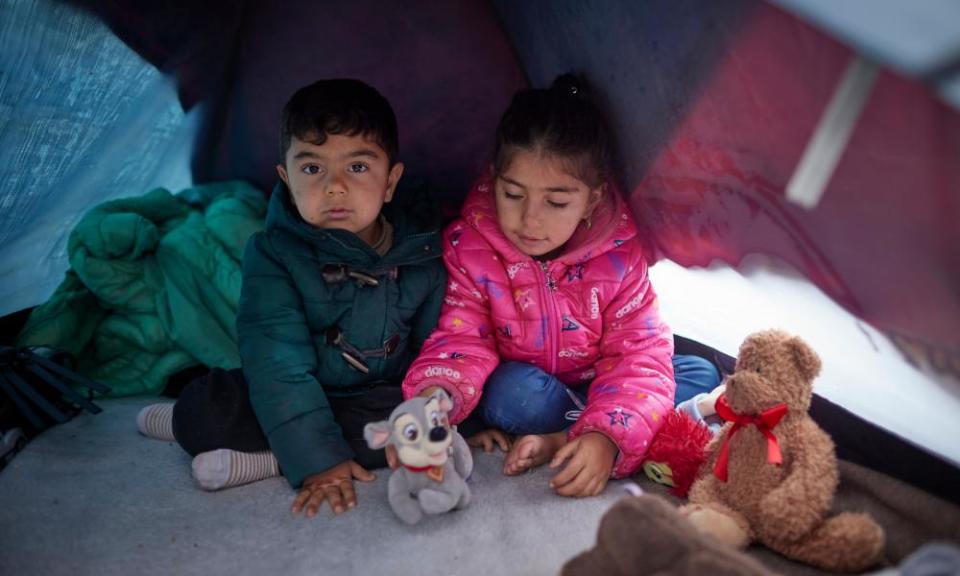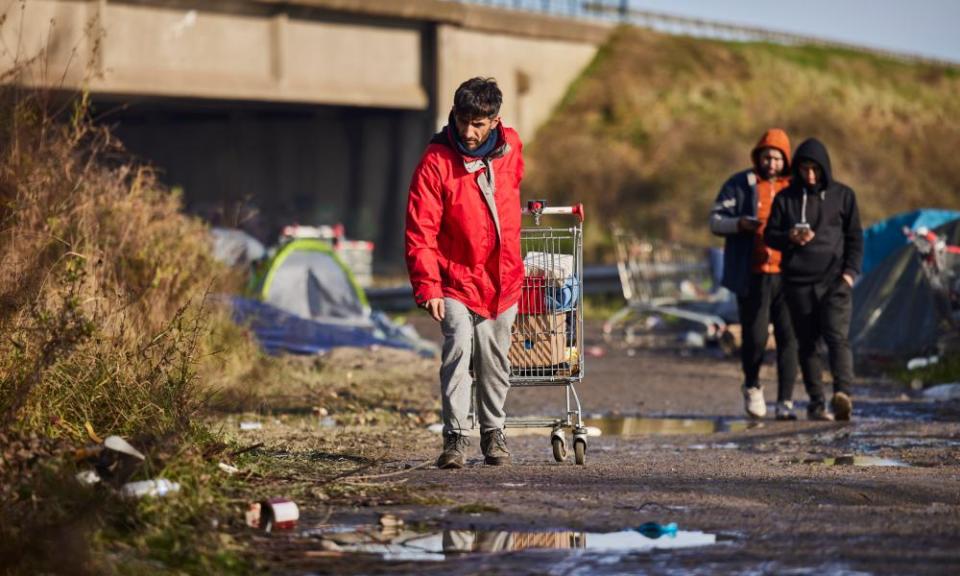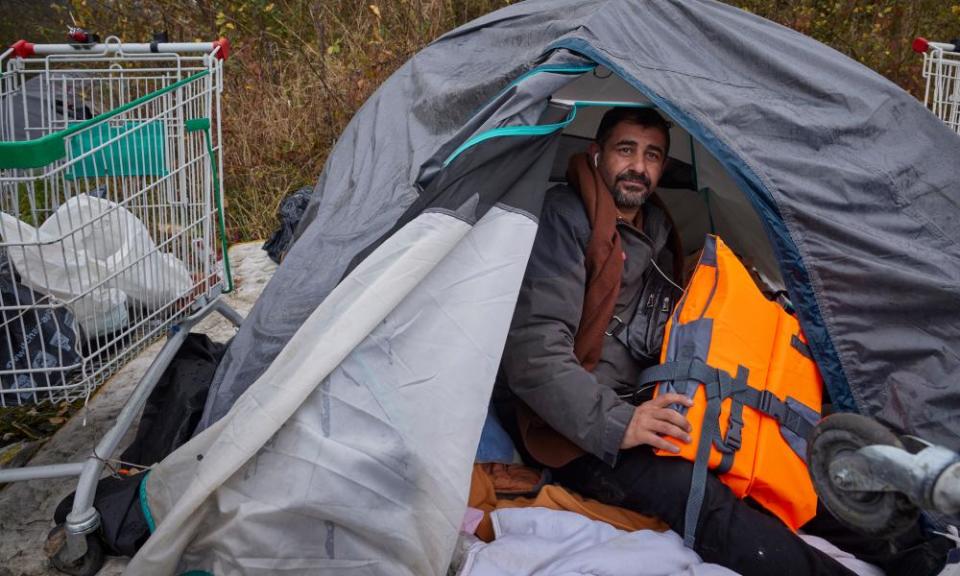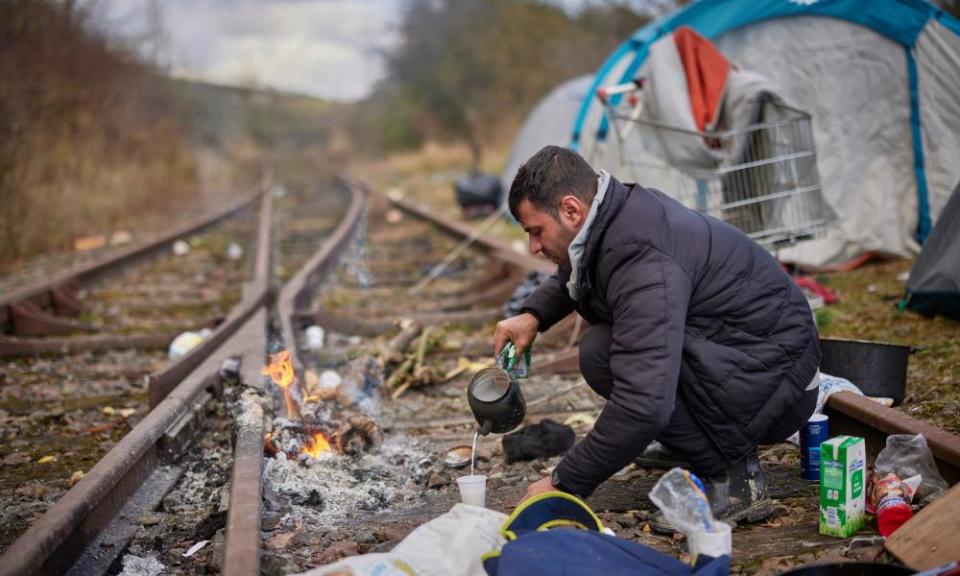Inside Dunkirk’s desperate refugee camps: ‘They take risks because they feel they have no choice’

Among the makeshift tents near the French beaches, we ask what drives people to make the perilous journey in small boats and what could prevent more deaths
There was a time when, if you googled the phrase “Dunkirk, small boats”, reports of one of Britain’s finest hours would stack up in the results. Not last week. The beaches near Dunkirk have now become synonymous not with the embarkation point of dramatic rescue but of despairing tragedy.
Related: Asylum in the UK: the key numbers
Details of the 27 people, among them seven women and three children, who drowned in the Channel on Wednesday have been very slow to emerge, their anonymity itself an indication of their desperation. The first to be named was a Kurdish woman from northern Iraq, Maryam Nuri Mohamed Amin, a newly engaged student, who was WhatsApp messaging her fiance, who lives in the UK, when the group’s dinghy started deflating. The 24-year-old had travelled through Germany and France to join Mohammed Karzan in the UK, paying people smugglers thousands of euros to get across the Channel in the absence of other possible routes. Karzan said that he had been in continuous contact with his fiancee and was tracking her GPS coordinates. “After four hours and 18 minutes from the moment she went into that boat,” he said, “then I lost her.”
Amin’s death, along with her 26 fellow passengers in their “paddling pool” boat, asks the question: what prompts these people to get into a dinghy in the freezing sea in darkness, in order to chase the distant lights of the UK? One answer lies in the makeshift camps near the Dunkirk beaches from where it seems that many of those who died had slept before setting out.
At Grande-Synthe, a town a mile west of Dunkirk, between the dual carriageway to Calais and the docks, there are a couple of hundred people living along a disused railway line under tarpaulins or in pop-up tents pitched on mud or gravel sidings. Walking among them on Friday, I wrote in my notebook: how much more hostile can an environment be? There is no water or sanitation. Many of these people, nearly all Iraqi Kurds, had been cleared from a large site up the road a few days before, as part of the local police policy of “continuous removal”. Their tents had been trashed and many of their few belongings lost or stolen. For many, that clearance was just the latest in a long history in a journey that had started 3,000 miles south-east.
The people I speak to in their halting English give blank smiles when they tell you how many months or years they have been here, or in places like this. Ribar Dhery, a man in his 30s, is sitting under the trees out of the rain. He lists the countries he passed through to get here from Iraq: Turkey, Greece, Bulgaria, Belarus, Poland. He escaped Iraq, he says, “because always people shooting”. He claims to have a brother in Leeds. “Here bad, England good,” he says. When I ask him how he will reach the UK, he answers by making undulating wave motions with his hands. Another, Abdul Rahman, tells me with a smile he has booked his passage – “Three thousand euros!” He arrived here a week ago from Afghanistan, “from Taliban”, paying for a lift from the Polish border. When I mention Wednesday’s tragic events he just shrugs.
The majority of those camping out in the rain and mud are young men, but there are several families, too, small children bundled up in coats and hats, holding tight to the shiny plastic of their few toys. Adil and Sarah have four children with them under the age of six, including a baby. They sit around a smoky fire of damp sticks between the railway tracks, trying to mark out some space of their own.
On Friday afternoons some charity trucks pull up with the offer of a hot meal and a cup of tea, and some clothes and blankets. Watching people jostle for children’s shoes or wait in line for the promise of a duvet in the rain, you feel like a voyeur of desperation, of lives exposed to the elements.

There is much talk of the so-called “pull factors” of coming to Britain. In Grande-Synthe the push factors look far more urgent. If you are living in a child’s tent with no running water and little food, spending nights on the bone-cold ground, you would want to be anywhere but here. Having been forced out of home and everywhere else, the promise of the UK is the next place, or the last place, on the line.
Certainly no one who has spent any time around these camps is surprised by last week’s tragedy. Anna Richel is a local representative of the charity Utopia56, which offers legal and practical help to refugees in Grande-Synthe. In recent months, she tells me, they have been forced to operate a 24-hour emergency line for those who get into distress in inflatable boats on the Channel. In the fortnight prior to the tragedy, she says, they had received at least 20 alerts on that line, many in the middle of the night, with a mayday signal and a pin location to enable Utopia56 to alert the coastguard: “Sometimes the boat is sinking, sometimes there is a hole in the boat, sometimes the motor is broken.”
She sees no sign that the winter will halt these attempted crossings, as in previous years. “They take a lot of risks because they don’t have solutions.” She and her colleagues don’t attempt to dissuade people from using the boats, “because we know that is what they will do anyway – we just try give to them the most information to stay alive. They are all absolutely scared, but they feel they have no choice.”
* * *
There are many stories of that imperative being enforced by the trafficking gangs. Local reports suggest a 23-year-old Iraqi Kurd was shot twice in the leg by traffickers on Wednesday after refusing to get on a dinghy and was taken by ambulance to hospital. As of last week 31,500 people were believed to have left the coast in a bid to get to the UK since the beginning of the year, and 7,800 had been rescued.
In the face of the latest tragedy – thought to be the biggest loss of life in the Channel since the war – politicians in the UK and France have been competing to imply that the blame lies elsewhere. The French interior minister, Gérald Darmanin, in reporting that five people had been arrested for people-smuggling in the current case [among “1,500 arrested this year”] was at pains to emphasise that the fifth smuggler arrested had “a German licence plate” and had “bought zodiacs [dinghies] in Germany.”
Our own prime minister didn’t even finish a full message of condolence before employing the “but” that implied the culpability first of the criminal gangs, then of the French police and government. In the shameful politicking of his tweeted letter to the French president, Johnson’s talked of “maritime patrol operations” and “ground sensors and radar” and “unmanned aircraft flying under joint insignia”; military solutions to a humanitarian crisis. “Boots on the ground” are one thing that the people in Grande-Synthe are desperate to escape.

A couple of times, a different approach has been tried here. Damien Carême, now an MEP for the Greens, was mayor in Grande-Synthe from 2001 to 2019.
In a conversation on Friday he explained how he saw the tragedy “as the direct consequence of the militarisation of the border between France and the UK: of the brutalisation and harassment of exiles on the French side and the inhuman hardening of the immigration policy of Johnson’s government to reassure the British of Brexit.”
These approaches – clearing camps, fortifying the lorry crossing at Calais, closing legal routes to asylum – have created the system that allows the smugglers to exist, he argues. When he was mayor of Grande-Synthe, in 2016, Carême built, with Médecins sans Frontières, the only humanitarian camp for refugees in France to accommodate more than 1,000 Iraqi Kurds, against the wishes of the state. The camp had wooden huts and sanitation and medical care and schooling for children. After a number of attempts by the French government to dismantle it, it was eventually evacuated in 2019; the huts were destroyed and people were shipped to different parts of the country, only to quickly return or be replaced by others.
For a short while, though, Carême says, “the population of Grande-Synthe was with us … in solidarity”. Despite the loud rhetoric of the right, “we must,” he says, “also stop underestimating [how], in spite of the obstacles put in their way by governments, human beings still take care of other human beings, heal, feed, welcome.”
* * *
For those now engaged with that effort in Grande-Synthe, the past week was the worst in years of bad weeks. At the railway encampment on Friday the British charity Care4Calais tried to fill some of the gaps in people’s lives. It bought a generator with sockets to charge mobile phones, around which a big crowd gathered, set up an ad hoc barbershop on chairs in the mud and a table with children’s games. Several teenage boys sat down and lost themselves for a while with coloured pencils; one drew the face of his girlfriend back in Iraq.
Care4Calais was established by Clare Moseley six years ago. She sees the shifting population at Grande-Synthe as a barometer of the world’s crises. “Bad things happen elsewhere and people end up in here,” she tells me. “Whether it’s the war in Iraq or Syria, starvation in the Yemen, and now the collapse of Afghanistan.”
She believes harsher approaches will only exacerbate the situation. “Some of these people have been in places where they didn’t eat for days, some have seen their family die, and by the time they get to Calais, they’ve already made that decision to cross to Britain.”
Her decision to create her charity was prompted by reading an article about the deaths in the Mediterranean in 2015. She was working in a corporate job at Deloitte at the time, she says, with little interest in foreign affairs. “But I just thought: how can people be drowning in the sea in Europe in 2015?” She came down to Calais and saw the state of the camps, and gave up her job, thinking: “we must do better than this.” Since Wednesday’s tragedy she says she has done 20 interviews with the British media and, “apart from the Today programme”, she didn’t hear mention of a different approach in any of them. “As usual everyone was talking about ‘how do we stop them coming in?’” she says. “Most people have got used to the idea of thousands of desperate people drowning each year in the Mediterranean. If we ever get used to the idea of people drowning in the Channel, then I think we are absolutely lost as a country.”

For some people, reading reports of the tragedy the surprise was that so many women were on the boat. Frances Timberlake helps to run the Refugee Women’s Centre in Dunkirk, which helps hundreds of women with “essentials and psychosocial support for gender-based violence and sexual and reproductive health”. It is an easy political tactic, she says, “to suggest it is only young men making the crossings where there are nearly always women and children involved.”
The charity’s work has got harder in the last year as the French police have stepped up their eviction operations, with British encouragement. People go further in their attempts to hide in the woods and dunes, she says, but also “staying put is increasingly not an option. On the ground women – like Amin – are not making comparisons about different government policies, they just want to rejoin their families or their partners.”
If the government has its way even more legal routes to asylum will be closed to such women, increasing the likelihood of desperate journeys across the Channel. The forthcoming nationality and borders bill is advertised, in words that will send a chill through any beating heart, as “firm but fair”. Even internal Home Office documents acknowledge its measures could in fact “encourage [people] to attempt riskier means of entering the UK”.
Last week Labour, SNP, Liberal Democrats and Green MPs laid down an amendment to the borders bill calling for a new “humanitarian visa system” under which people who can give good reason – family links – for wanting to travel from France to the UK can cross safely and apply for asylum here. In another amendment tabled on Tuesday, the Tory MP David Davis called for MPs to remove the clause in the bill that allows asylum seekers to be “processed offshore”.
* * *
Médecins Sans Frontières, which established the mayor’s camp at Grande-Synthe, has long experience in the effects of some of these policies in other parts of the world. Before the bill was announced, it sent a letter to the home secretary, outlining its research that showed the Australian model of “offshore processing” on the island of Nauru, on which Priti Patel’s idea seems to be based, caused “some of the worst mental health suffering we have seen in our 50 years of existence”, with a third of MSF patients attempting suicide, including children as young as nine. The letter also pointed out that the policy was recently revealed to cost more than £2.3m for each individual refugee, every year. MSF did not even get the courtesy of an acknowledgement that the letter had been received.
Sophie McCann of MSF says that, contrary to the government’s apparent belief, “it’s certainly not illegal to seek asylum … by their own statistics two-thirds of people who come to the UK will be found to be refugees. The bill basically criminalises anyone who tries to come to the UK irregularly, while at the same time closing down all legal routes from within Europe.”
One hope is that the fact of children drowning in the Channel might finally soften British attitudes to the crisis. The last time that happened – when the body of three-year-old Alan Kurdi washed up on a Turkish tourist beach in 2015 – the government announced it would take in 20,000 Syrian refugees. Since Brexit, similar commitments to unaccompanied minors and the reuniting of families have been shamelessly abandoned.
On the dual carriageway outside Grande-Synthe there is one of those hangar-sized French Auchan supermarkets selling a dozen varieties of everything. The refugee camp is half a mile away. In the supermarket car park there was a bizarre divide between shoppers picking up their Christmas trees, and groups of young men and families from the camp, wandering up and down the hard shoulder, because they’ve nowhere else to go. Watching them, I wondered what a reinvented Dunkirk spirit might look like, one that included these great survivors of impossible journeys, rather than thinking of ever harsher ways to shut them out. Until we collectively start to imagine what that might look like, one thing is certain: many more people will take the risk of those 27 who lost their lives last week.

 Yahoo Finance
Yahoo Finance 